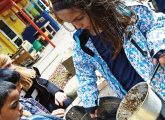Use these ideas from Linda Mort in your festivals and celebrations EYFS planning and learn about why this is such as important area to cover…
The beliefs and values of the world’s religions and cultures are expressed in many ways, including through festivals and celebrations.
Whether they relate to rites of passage, the seasons, living things or revered objects, festivals and celeberations play a highly significant role in the lives of many children worldwide. They help children nurture their sense of identity, values and beliefs.
The EYFS values the role that festivals and celebrations play in supporting children’s learning and development in every area of learning.
Use them to support children in beginning to understand the commonalities of human values that are shared by all cultures and religions.
The EYFS encourages families and providers to help children understand one another’s cultures and beliefs in a world that’s diverse and vibrant.
Help young children develop an understanding of religious festivals through the context of family experiences. This acknowledges and affirms the culture and beliefs of individual children.
Sharing such information helps pictures in books ‘come to life’ for children, making them meaningful and memorable.
Children will learn that members of families of all religions (or of none) love one another and that they show this in different ways. For example, they may prepare special food and exchange gifts.
Use the context of receiving and giving gifts to explain to children that families of all religions (or of none) make others happy by taking the time to choose appropriate presents.
Another valuable lesson in this context is that of voluntary service and charitable giving. People think about others outside of their family circle who might need practical or financial help.
This could include visiting elderly people and also giving them harvest foods, giving poor people Zakat-ul-Fitr (money) at Eid-ul-Fitr, and helping children in need through the Children’s Society charity, which raises money from Christingle services at Christmas.
Through religious festivals, children can also learn that families of different religions may pray at home and attend places of worship where they meet other people to pray. They thank their god for everything in the world and think about how to be kind to one another.
Children can relate to the events told in festival stories and also to the moral of a story, so long as you explain it simply and in terms of feelings that they understand.
This might include, for example, in the Diwali story, how Sita and Lakshman accompanied Rama into the jungle, because they didn’t want him to feel lonely.
Many festivals are perfectly attuned to children’s sense of wonder at the natural world and their need to sometimes be tranquil.
Many stories told at festival time emphasise a reverence for nature, for example, the story of the early life of the Buddha at Wesak.
Such stories are ideal for giving children opportunities to be “curious, enthusiastic, engaged and tranquil, so developing a sense of inner-self and peace” (EYFS, Personal, Social and Emotional Development: Sense of Community).
Teach children about the Jewish Springtime festival of Tu b’shevat, the New Year for Trees. Ask for children’s own ideas about how to celebrate World Environment Day (June 5th).
Use your festivals and celebrations EYFS planning to encourage children to look for, and to talk about, kindness in others, and celebrate one another’s achievements.
Talk about birthdays, Mother’s Day, Father’s Day and Grandparents’ Day. Nurture, too, an enjoyment of thinking of simple events which give everyone pleasure, and ways to celebrate them. For example, make up a poem or song about how pleased people are to see the birds come to feed at the bird table.
Ask families from various countries for information about their customs for celebrating birthdays and festivals. For example, in Germany, children are given a special birthday candle marked off with lines and numbers. On each birthday, the candle is allowed to burn to the next line.
At Christmas in Holland, Sinter Klaas visits children’s homes and talks with them about their achievements during the past year, and their plans for the year ahead.
An imaginative approach to helping children experience festivals and celebrations can support their learning in many areas.
When a child explains to others how they celebrate a festival or take part in a celebration, they develop their self-confidence and self-esteem. This also nurture’s children’s awareness of, and respect for, others’ beliefs.
Listening to stories at festival time can help children develop a sense of right and wrong, as they re-tell and re-enact the stories.
Use festival seasons to develop a sense of the passing of time. Children can use all of their senses when finding out about, and making their own different festival foods, fabrics and artefacts.
They can also express their ideas and feelings about festivals and celebrations in a variety of creative ways. This might include music, dance and role-play.
By offering children the opportunity of sharing the joy of others’ festivals and celebrations, we give them a gateway into a world of mutual understanding and shared human values.
Where possible, it’s good to invite visitors into your setting at festival times to talk about their experiences of a celebration…
A great way to help children to be accepting of others’ cultures and beliefs is to look at a festival that’s unfamiliar to them. Use puppets to ‘answer’ children’s questions.
This conveys to children an open and enquiring attitude to different faiths. It will help them to treat other people of various religions and cultures with respect.
This article is an edited extract from The Fabulous Early Years Foundation Stage, edited by Terry Gould and published by Featherstone.

Maths outdoors EYFS – Maths activities to try outside
Editors picks
